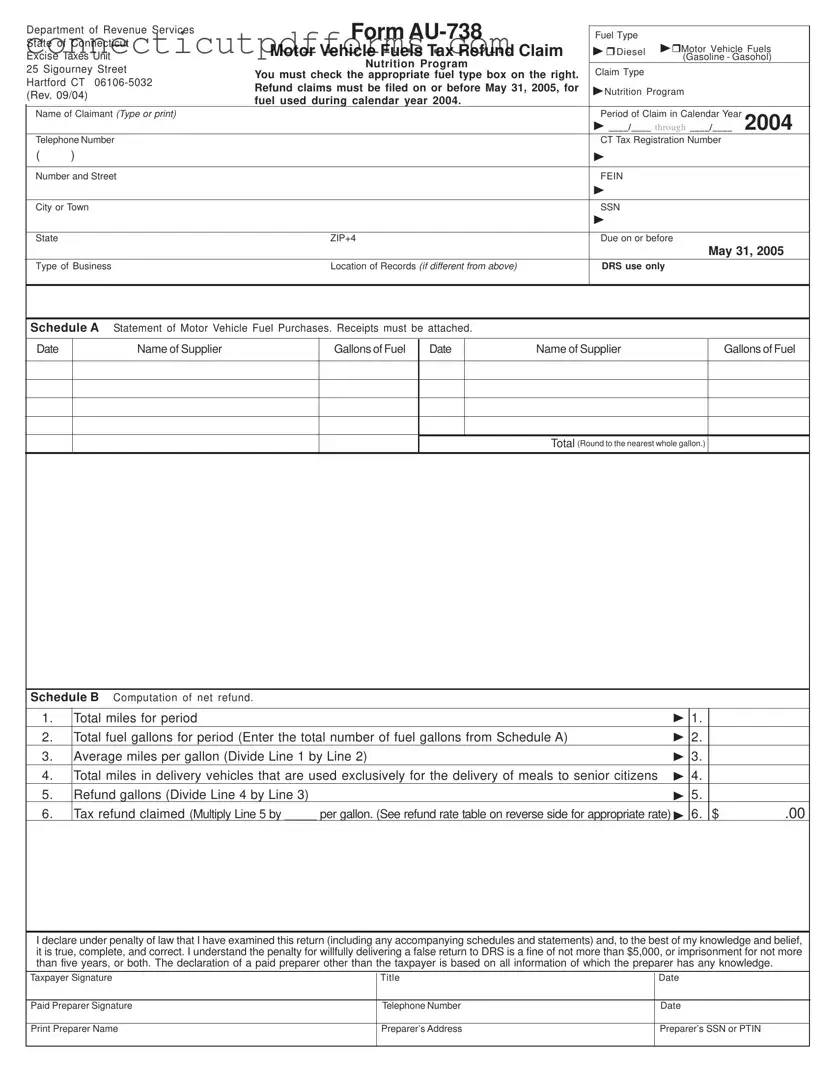The Connecticut AU-738 form is similar to the IRS Form 8849, which is used for claiming refunds of excise taxes. Both forms require detailed information about fuel purchases and usage. Claimants must provide supporting documentation, such as receipts, to substantiate their claims. Each form has specific deadlines for submission, ensuring that claims are processed within a designated time frame. Both forms also emphasize the importance of accurate information, as errors can lead to penalties or denial of the refund.
Another document comparable to the AU-738 is the IRS Form 2290, which is used for heavy vehicle use tax. This form also requires information about the vehicle and the amount of tax owed. Just like the AU-738, it necessitates that the claimant keep accurate records of vehicle usage and fuel purchases. Both forms are designed to ensure compliance with tax regulations, and they require submission to the respective tax authority by a specific deadline.
The Connecticut AU-738 is also similar to the California BOE-401-A2, which is a claim for refund of the diesel fuel tax. Both documents require claimants to report the amount of fuel used and provide calculations for the refund. Additionally, both forms require the attachment of supporting documentation, such as invoices or receipts. The purpose of both forms is to facilitate the refund process for taxes paid on fuel used for specific purposes.
Another related document is the New York Form FT-500, which is used to claim a refund of fuel taxes. Similar to the AU-738, this form requires detailed information about fuel purchases and usage. Both forms have sections for calculations that determine the refund amount based on fuel consumption. Claimants must also adhere to submission deadlines and maintain records to support their claims.
Understanding the importance of proper documentation in various processes is essential, particularly when it comes to claiming refunds or approvals. For instance, individuals seeking an Emotional Support Animal Letter can find valuable guidance at https://topformsonline.com, which offers insights into how these letters are obtained and the necessary requirements to ensure compliance and support for mental health needs.
The IRS Form 720 is another document that bears similarities to the AU-738. This form is used to report and pay various federal excise taxes, including those related to fuel. Both forms require detailed reporting of fuel usage and calculations for refunds. Accurate record-keeping is essential for both forms to ensure compliance and successful claims. The forms also share a common goal of ensuring that taxes are paid appropriately and refunds are processed efficiently.
Additionally, the Texas Form 01-114, which is used for motor fuel tax refunds, is akin to the AU-738. Both forms require claimants to provide detailed information about fuel purchases and usage. They also necessitate the submission of supporting documentation, such as receipts. Timeliness is crucial for both forms, as they have specific deadlines for filing claims to ensure that refunds are processed in a timely manner.
The Florida Form DR-26 is another document similar to the AU-738. This form is used to claim a refund of the fuel tax for certain types of fuel usage. Both forms require detailed information about fuel purchases and usage, along with supporting documentation. The filing deadlines and the requirement for accurate record-keeping are common features of both forms, ensuring compliance with state tax regulations.
The Illinois Form CRT-61 is also comparable to the AU-738. This form is used for claiming refunds on motor fuel taxes. Similar to the AU-738, it requires claimants to provide detailed information regarding fuel purchases and usage. Both forms emphasize the importance of submitting accurate information and retaining supporting documents to substantiate the claims. Filing deadlines are also a critical aspect of both forms.
Lastly, the Michigan Form 5117 is similar to the AU-738 in that it is used to claim refunds for fuel taxes. Both documents require detailed reporting of fuel usage and calculations for refunds. Claimants must attach supporting documentation, such as invoices or receipts, to substantiate their claims. Adhering to submission deadlines and maintaining accurate records are essential components of both forms to ensure compliance with tax regulations.



